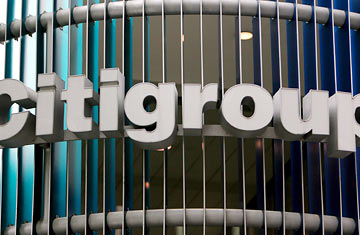
While much of Wall Street and the rest of the financial sector are finally seeing some sun, the storm clouds around Citigroup just don't seem to be breaking. The company said on July 17 that it earned $3.4 billion in its second quarter. It was the second quarter in a row that Citi had announced a profit, after many critics said the company was done for. In a press release, Citigroup CEO Vikram Pandit triumphantly said, "Our financial results today reflect the incredibly dedicated efforts of all of our people around the world and their success in implementing our plan."
But in the days since the bank boasted of its profits, the company's stock has fallen nearly 10%, to a recent $2.80. Shares of rivals Goldman Sachs and JPMorgan — both of which also produced profits in second quarter — have risen in the same time.
The problem, it appears, is that few people think Citigroup's earnings rebound is sustainable. Following the bank's strong earnings announcement, analyst John McDonald, who covers Citi for Sanford C. Bernstein, cut his estimates of what the bank could make next year. Instead of his earlier projection that Citi would turn a profit in 2010, McDonald thinks the bank will be solidly in the red next year, losing $3 billion. In his report, McDonald said investors should worry about "the earnings power and strategic direction of the franchise amid all the change and increased government ownership now under way."
And McDonald is not alone. David Hendler of CreditSights recently lowered his rating on Citi's stock to the equivalent of a "hold." Says Hendler: "Our view is that Citi is in the midst of a large scale disassembly of the global franchise, and the ultimate configuration of the company remains murky."
Spooking analysts and investors is the fact that losses at several of Citi's businesses continue to grow. What's more, a number of executive departures are complicating the bank's turnaround efforts. Lastly, while Citi's lending losses are not growing as fast as they were, the bank's loans are still going bad at a higher rate than that of its rivals.
"Citigroup results indicate continued deterioration on the credit side," says Christopher Whalen, managing director of research firm Institutional Risk Analytics. "Citi is an outlier in terms of loss rates, above Bank of America and Wells Fargo."
For its part, Citigroup says its turnaround plan — which has effectively split the company in two — is working. And while Citi Holdings, in which Citi has stuck its mortgage loans, is still in bad shape, Citi officials say Citicorp, which the bank calls its "core" investment bank and its retail bank divisions, is on the mend. Later this week, Citi plans to complete the first stage of a deal to swap a large chunk of its preferred shares for common stock, which will greatly improve the financial standing of the bank — though it will also more than quadruple the company's shares outstanding and result in the government's owning 34% of Citi.
Moreover, a look beneath its recent earnings report reveals that Citi is still struggling to extricate itself from the credit crisis. All of Citi's profits and then some in the second quarter were the result of a onetime gain on the sale of 50% of the company's Smith Barney brokerage division to Morgan Stanley. Take that out as well as some other onetime events, and CreditSights' Hendler says the company actually lost 70 cents a share, or about 30% more than it did in the same three-month period a year ago.
And compared to rivals, Citi's performance looks even paler. Goldman Sachs and Wells Fargo both reported higher earnings in the second quarter than a year ago. JPMorgan's earnings were down from a year ago, but it still outperformed Citi in many parts of its business. Investment-banking revenues at Citi, for instance, fell 13% in the second quarter from a year ago; JPMorgan's investment-banking revenues rose 29% in the same time, according to Bernstein's McDonald. Then there's the issue of talent loss. As Citigroup's troubles have continued, the bank has begun to lose executives to rivals. The most notable departure thus far is Ajay Banga, who headed the bank's Asia Pacific operations. He left Citigroup last month for MasterCard.
The most discouraging news remains Citi's loan portfolio. The bank's costs for bad loans jumped in the quarter by 81%, to $12.4 billion. The percentage of loans the company expects to go unpaid also continued to rise, though slightly less than before. Still, Citi's loans are going bad faster than those of many of its rivals. In the third quarter, the bank had a so-called net charge-off ratio, which is the percentage of loans that are likely to not be paid back compared to total loans, of 5.1%, according to CreditSights. That compares to a charge-off ratio of 2.6% for JPMorgan and 3.6% for Bank of America.
"Are they making progress? Definitely," says Edward Najarian, an analyst who follows Citigroup for International Strategy and Investment Group. "Will this be a $30 stock again? Not anytime soon. There has been way too much dilution in shares outstanding."
